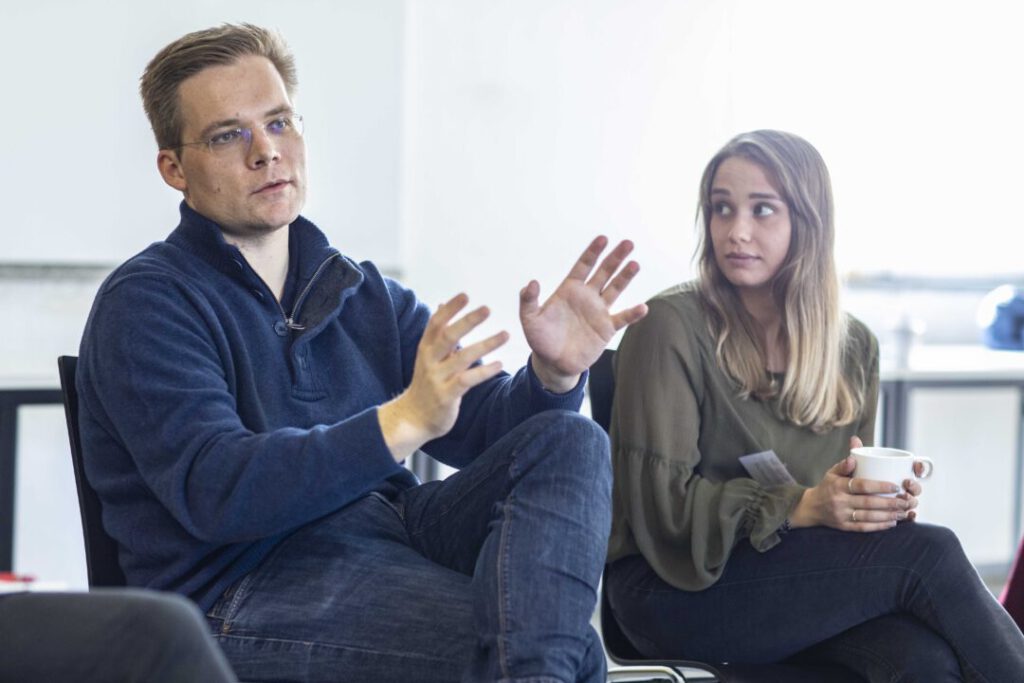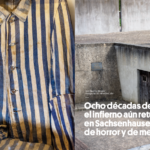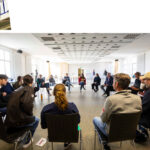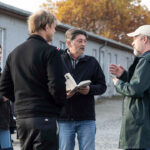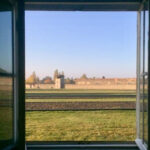TALK TOGETHER! No. 82 – 4/22
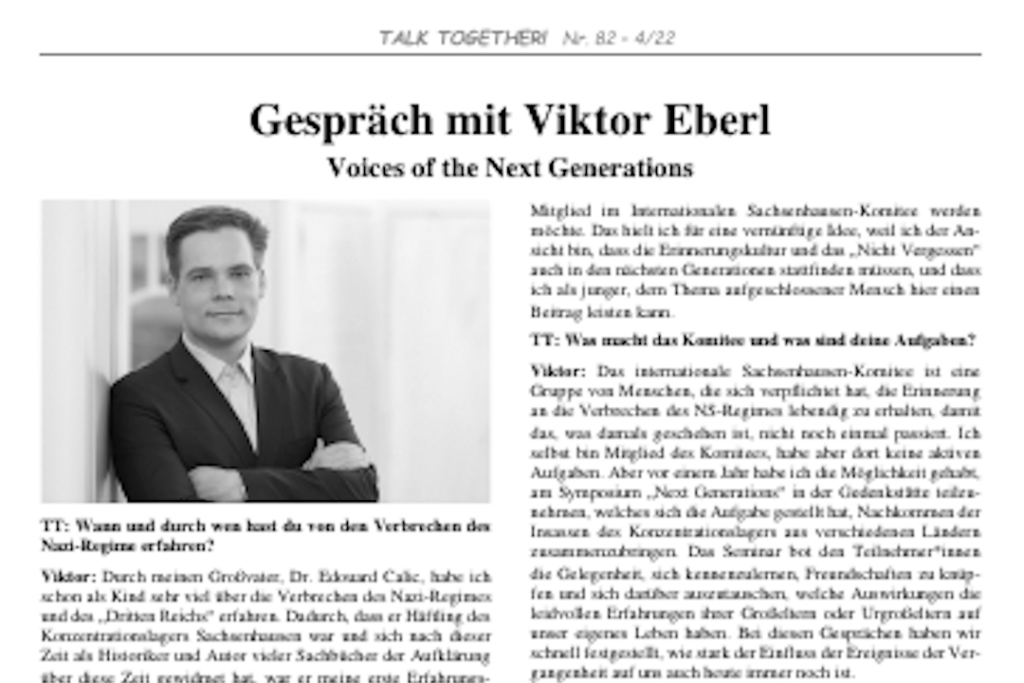
TT: When and through whom did you learn about the crimes of the Nazi regime?
Viktor: Through my grandfather, Dr. Edouard Calic, I learned a lot about the crimes of the Nazi regime and the „Third Reich“ as a child. Because he was a prisoner of the concentration camp in Sachsenhausen and, after that time, dedicated himself as a historian and author of many non-fiction books to the enlightenment of this period, he was my first source of experience and had a decisive influence on me. Although he died when I was very young, my conversations with him sparked my interest in the subject.
TT: What is your drive to explore this topic?
Viktor: Through the conversations with my grandfather, I learned a lot about what he experienced and what he had to go through, but also about his contacts with other prisoners, which he continued to maintain even after his time in the concentration camp. Through him, I learned that words and ideologies can one day very quickly become actions if there is a charismatic leader figure and people to carry the message forward. Even though I didn’t experience that time myself, those conversations were a great impetus for me to work to ensure that the crimes of the past are never forgotten. If you want to prevent something like that from happening again, it’s first important to know what happened in the past so you can do preventive work based on that.
TT: Since when have you been a member of the International Sachsenhausen Committee and how did you become involved?
Viktor: I visited the concentration camp memorial at a young age. I was impressed how the memorial managed to document and come to terms with the crimes during that time. Then, during my studies, I did an internship at the memorial’s media center. I had the opportunity to research the history of the concentration camp and its inmates in the archive, and as a result I became more and more familiar with the subject matter. Two years ago, the memorial approached me and asked me if I would like to become a member of the International Sachsenhausen Committee. I thought that was a sensible idea, because I believe that the culture of remembrance and „not forgetting“ must also take place in the next generations, and that I, as a young person open to the subject, can make a contribution here.
TT: What does the committee do and what are your tasks?
Viktor: The International Sachsenhausen Committee is a group of people committed to keeping the memory of the crimes of the Nazi regime alive, so that what happened then does not happen again. I myself am a member of the committee, but I have no active duties there. But a year ago, I had the opportunity to I had the opportunity to take part in the symposium „Next Generations“ at the memorial site, which had the task of bringing together descendants of concentration camp inmates from different countries.
The seminar gave the participants the opportunity to get to know each other, make friends and exchange ideas about the impact of their grandparents‘ or great-grandparents‘ painful experiences on our own lives. During these conversations, we quickly realized how strong the influence of the events of the past still is on us today. On the other hand, we discussed the question of how we can carry on the tradition of remembrance into the next generations with joint projects, in order to lay an important building block for the prevention of future catastrophes. Thus, we decided to launch the website „Voices of the next generation“(1), where descendants of the third and fourth generation report on their dealings with the history of persecution of their grandfathers and great-grandfathers.
The website provides space for historical, personal, and artistic reflections on the still ongoing effects of Nazi persecution and murder. The seminar was held at the youth hostel, which is housed in a house that belonged to a high-ranking Nazi at the time. It was a bit macabre to spend several days here discussing what to do so that the deeds of this man, too, would not be forgotten. We have since held a second seminar, and it has been great to see how much the group has changed the lives of the members.
TT: To what extent did the imprisonment in Sachsenhausen also shape the lives of the following generations? And how did the group change the lives of those affected?
Viktor: When someone was imprisoned in a concentration camp for several years and then sent on the death march, it is a profound cut in their life story, which inevitably affects the following generations.
It was interesting to see that many of the descendants of concentration camp victims have embarked on an artistic career in order to process their feelings. And when you then meet a person from another country whose grandfather was imprisoned in the Sachsenhausen concentration camp for several years as a political prisoner, just like your own grandfather, you realize that the two of them probably knew each other and must have crossed paths often. In the meantime, the group has become a second family. We meet regularly either online or when we visit a city where a member of the group lives. When you share these experiences in your family history, it results in a connection on a whole other level, and you can see that in the way you interact with each other.
TT: Do you also face resistance?
Viktor: Our group doesn’t, but we hear from the memorial that during tours or in exchanges at the memorial, sometimes an argument is put forward with which Nazi crimes are, I don’t want to say trivialized, but at least put into perspective. Moreover, in recent years the memorial has also devoted itself to the side of the perpetrators, which provides an additional surface for attack. It was already fierce for us to see that many of the perpetrators from the Sachsenhausen concentration camp were able to seamlessly continue their careers in post-war Germany. It is often said that these people were needed for reconstruction, but I think that is a difficult argument. At one point last year, the question arose as to whether we should also establish a group to exchange ideas with the descendants of the perpetrators. However, this idea has been put on the back burner for the time being, because we want to devote ourselves first to the progress of our own projects and the culture of remembrance at the memorial site. We also have to defend ourselves against the argument that the world war has now been over for almost 80 years and that it should finally be good.
TT: In your opinion, are politicians doing enough to prevent such crimes from happening again?
Viktor: In view of the current situation, whether it is the pandemic or the war in Ukraine, we see that many people are in dire straits. Political, economic and social grievances are triggers for social unrest and frustration. If politicians cannot provide answers to the problems, this provides an ideal breeding ground for the propaganda of right-wing and right-wing populist parties, which poison the social climate with their hatred. This was seen in France and is now being seen in Italy, as well as in Germany and Austria.
If things continue like this, there will soon be so much frustration in society that the door will be opened to those who promise simple solutions.
However, if right-wing populist and far-right parties come to power across Europe, this will undoubtedly fundamentally change European societies. Such movements always pin freedom on their banners, but in reality they have something quite different in mind.
Whether enough has been done? There are countries in which the subject of National Socialism has been dealt with, but there are also others that have not done so, or have done so to too limited an extent. You can see the result when right-wing parties get up to 30 percent of the vote in some regions. I also think that in some parts of Europe the education system has failed. I think the approach is good, as it is practiced in Germany, for example, that students should have visited a concentration camp memorial at least once. Some people think that the subject is not reasonable for young people, but I am convinced that from a certain age the topic can and must be dealt with in detail.
TT: Why is memory work so important?
Viktor: I think that it is important for an open-minded and progressive society to also address the low points of our civilization and to remind people that words can also become deeds. In my opinion, it is very important to also involve younger people who have more distance to this time and can also promote the topic of remembrance culture in the distant future.
After all, I am afraid that at some point the question will arise as to why so much money should be spent on memorials and museums. Besides, almost every inmate of the concentration camps is now dead, and there is only the second or third generation who can talk about it.
TT: Anti-Semitism is strongly condemned today, which is good and right. On the other hand, the European Union itself violates human rights, for example in its treatment of refugees. How do you see that?
Viktor: I fear that people want to play the weakest in society off against each other in order to distract from their own incompetence, as we are seeing in Austria right now. You try to direct the anger of the population towards a group that can’t defend itself by talking about having so many refugees again and having to put up tents.
TT: Why don’t non right-wing parties have much to counter this propaganda?
Viktor: Populist movements are getting stronger and stronger because politicians are not providing answers to the pressing challenges of our time. The problem is that the quality of political personnel is currently very manageable, and everyone is fighting for their own political survival. Politics is currently more like professional soccer, people say to themselves, I’ve got my 10-15 years, maybe jump from one position to another because that’s what the party wants, and behind me is the deluge. But there is a lack of vision and courageous approaches to tackle the problems of our societies. Everyone knows that the health care system and the education system urgently need to be reformed. The European Union was first founded as a peace narrative, then it became an economic narrative; in my view, it would be time to turn it into a social narrative.
The ideologies should be put aside and joint efforts should be made to implement these projects at the European level, because only in this way can we – from my view – strengthen the social fabric and close cracks in society again.
Viktor Eberl is head of studies at the Europäische Akademie Nordrhein-Westfalen e.V.
_____________
(1) https://voices-of-the-next-generations.org
Edouard Calic (Eduard Čalić), 1910-2003, was an Istrian-born journalist, publicist, and historian. After the German occupation of Yugoslavia, the daily newspaper Novosti, where he was employed, was banned. In 1942, Calic was arrested by the Gestapo under the pretext of being involved in a conspiracy of foreigners and was taken to the Sachsenhausen/Oranienburg concentration camp. In 1945 he was sent with other prisoners on the death march from Sachsenhausen to Schwerin. After the war he devoted himself to researching and coming to terms with Nazi crimes.
